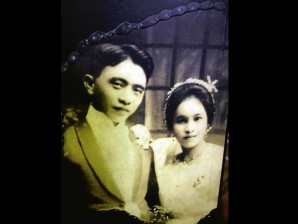Couple’s love gives birth to Angeles

JUAN AND TERESA Nepomuceno nurtured love beyond them, extending it to family, community and church. PHOTO REPRODUCTION BY TONETTE OREJAS
ANGELES CITY—A love story for an intangible heirloom? What makes the union of Juan and Teresa Nepomuceno exceptional is that as they strengthened their love for one another and reared 10 children, the couple spread the Roman Catholic faith and helped build Angeles City through their business and social enterprises.
The intangible becomes forever because the oral histories on the lives, love, family and the causes taken up by Juan and Teresa have been preserved in a book that won the National Book Award in 2004.
Some readers say reading “A Cofradia of Two” by Erlita Mendoza seems like reading an intimate history of Angeles or getting pointers on how to nurture a partnership and be parents, church and community leaders all at the same time.
In the early 20th century setting, the couple did not limit their love to one another. Juan and Teresa transformed it into quiet service, charity and philanthropy.
“Stories of beginnings, narratives of struggles and triumphs, wars and disasters, moments of love and abysmal losses, infinite faith in the Divine: Juan and Teresa had some of the finest hours that our beloved city has ever seen—and will probably never see in a long time to come,” Mendoza writes.
Article continues after this advertisementShe says: “While their story belongs to their children and grandchildren, this saga belongs, too, to the people of Angeles and to the nation.”
Article continues after this advertisement
Inexorably linked
“It is ours to find rightful pride in and good reason to share with our fellow Filipinos. Juan , Teresa and the city of Angeles are inexorably linked, past, present and future. God ordained it to be so the moment Juan and Teresa exchanged I dos—and forsaking personal affliction, promptly reached out their hands in lives of service for others.”
Juan (born March 8, 1892) was a great grandson of Don Angel Pantaleon de Miranda, the founder of then Barrio Kuliat, which became a city in 1964. Teresa (born Aug. 12, 1893) was a granddaughter of Patricia Mercado and Fr. Guillermo Masnou.
Juan was released from the Jesuit seminary after typhoid fever made him ill, studying law later for which he passed the bar in 1918. Teresa reached third grade due to poor health.
Juan’s style of courtship was maglolo ya ang mata (courted through the eyes). This shy and reserved style won the nod of Teresa’s grandmother, Severina Pamintuan. On the day of betrothal, Juan’s father gave Teresa the family’s cherished jewelry while Teresa’s mother gave Juan coins worth P5,000.
After the wedding on March 19, 1919, Teresa learned that Juan gave money to poor clients than charged them professional fees. She sent her servant to her mother to get extra money for food.
They began running an ice plant in 1921, the Angeles Electric Light and Power Plant in 1923, Reina and Aurora Soft Drinks in 1928, Holy Angel Academy in 1933, Villa Teresa Subdivision in 1965, and Nepo Mart in 1968. Teresa handled the operations and Juan, the accounting and bookkeeping.
Lessons of sacrifice
All their children—Javier Jesus, Aureo Jose, Geromin Pedro, Juan Mamerto, Camero Patricio, Teresita Marcela, Aurora Hilda, Flora Gracia, Josefina and Pedro Pablo—worked in the businesses while they were young to learn honest labor and discipline.
In between, relatives of the couple lived or visited in their two houses, prompting the children to learn to make sacrifices.
During the war when nearby Fort Stotsenberg (later Clark Field) was the target of attacks, Juan and Teresa evacuated their family and relatives to Bacolor and Porac in Pampanga and to the Kipping house in Camiling, Tarlac. Teresa sold food and other items to tide the family over.
The couple, Mendoza says, realized the “ephemeral nature of material possessions and the importance of family solidarity in the face of grave danger.” They also endured the pain of waiting for Javier Jesus who fought in Bataan and forced to join the Death March during World War II.
Good fortune
Teresa campaigned for women’s right to vote and funded hospital programs. Juan gave free legal services, served in sodalities (charitable groups for the laity), briefly ventured into politics and sent poor children to school. The couple supported the studies of seminarians.
“My good fortune was to have been married to a woman who also loved and appreciated machines,” Juan was said to have told friends.
On their 50th wedding anniversary, Juan and Teresa received the Rizal Pro Patria Award for family solidarity given by Civic Assembly of Women of the Philippines. Juan received the Papal award Knight of St. Sylvester.
She died at 76 in 1970 and he, at 81 in 1973.
How they lived and loved, says Mendoza, echoed in Juan’s motto, “All for the greater glory of God,” and Teresa’s “Do it well or not at all.”